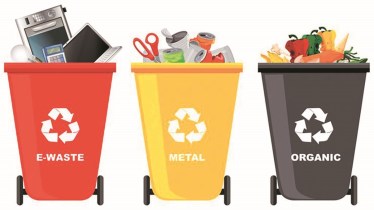While the increased use of electrical and electronic products has brought much ease in going about the day-to-day chores, it has also given rise to a major problem in the form of piling electronic waste, or e-waste.
E-waste is any piece of electrical or electronic product or equipment that is discarded. It can range from discarded small and large home appliances such as microwaves, electric stoves, vacuum cleaners, and washing machines to IT and communication products such as laptops, computers, and smartphones. Ever since the smartphone space blew up, it has compounded the problem. Last year alone, more than 5.3 billion smartphones were thrown away, according to the Waste Electrical and Electronic Equipment (WEEE) Forum. Overall, a meagre 17% of the total e-waste is properly dealt with, collected, and recycled, as per reports.
Although less spoken about, it is a major issue especially given its impact on health, both of humans and the Earth. For example, much of the waste ends up in landfills, and the melting and burning of electronic products can lead to a rise in lead in landfills. Not only that, the toxic fumes can be a major cause of pollution and contamination. These products are made of metals and elements, and improper disposal can reportedly be detrimental to human health. Here, the risk to personal security warrants a mention. Smartphones, computers, and laptops can contain personal and sensitive information. Hence, erasing the data carefully and completely is essential before discarding these devices.
Tackling e-waste
While companies worldwide have added to the e-waste menace, some firms have rolled out initiatives to tackle the same.
For example, aluminium and copper manufacturer Hindalco Industries has planned to invest `2,000 crore to develop a copper and e-waste recycling facility.
Hindalco’s chairman Kumar Mangalam Birla revealed the plan to the shareholders, this August, at the company’s annual general meeting. At that time, Birla had reportedly said that it would tackle the challenges caused by e-waste. To bring circularity and inclusivity to the e-waste recycling sector in India, E[co] work, a physical facility for safe dismantling of e-waste and social inclusion, has recently launched a co-working space in Ghaziabad, Uttar Pradesh for microentrepreneurs, dismantlers, and recyclers to institutionalise e-waste management.
Similarly, Noida-based startup Attero forayed into electronic waste management back in 2008, long before the topic was even prominently discussed. Not only companies, but some individuals, too, have taken it upon themselves, and are playing an active role in fighting the menace. For instance, entrepreneur Raj Kumar, founder and CEO of Deshwal Waste Management realised the mounting issue while working in the IT sector, as per a media report. Since then, he has established e-waste recycling facilities to tackle the issue. Interestingly, electronics giants, such as Oppo and Samsung, too, operate recycling facilities, where they take back discarded electronics products.
The individual’s effort
Given how individuals contribute to the e-waste problem, there are steps all of us can take to make a positive impact:
- Recycling is the first and foremost strategy when it comes to tackling e-waste. Getting to know the recycling possibilities in one’s region can greatly help
- Several electronics companies such as Oppo and Samsung have what is called the bring it back to company policy and operate their own recycling centres. Hence, ensure that the companies you are buying a product from, a mobile phone, camera, or any other device, have such a policy in place. This will add the responsible quotient to your overall purchase
- Speaking of purchase, it can always help to buy fewer items, and probably those that are necessary. Also, go for long-lasting and recyclable products
- Instead of discarding, try to sell the devices you no longer need. Not only does it make economic sense, but is ecological too
- Instead of throwing away the devices you no longer need choose to donate them to schools, NGOs, or any such institutions in need of the products. In the end, just being mindful from purchasing to using to giving the products away can play a considerable role in tackling the e-waste menace. Educating others, especially kids and youngsters, is also crucial here.
